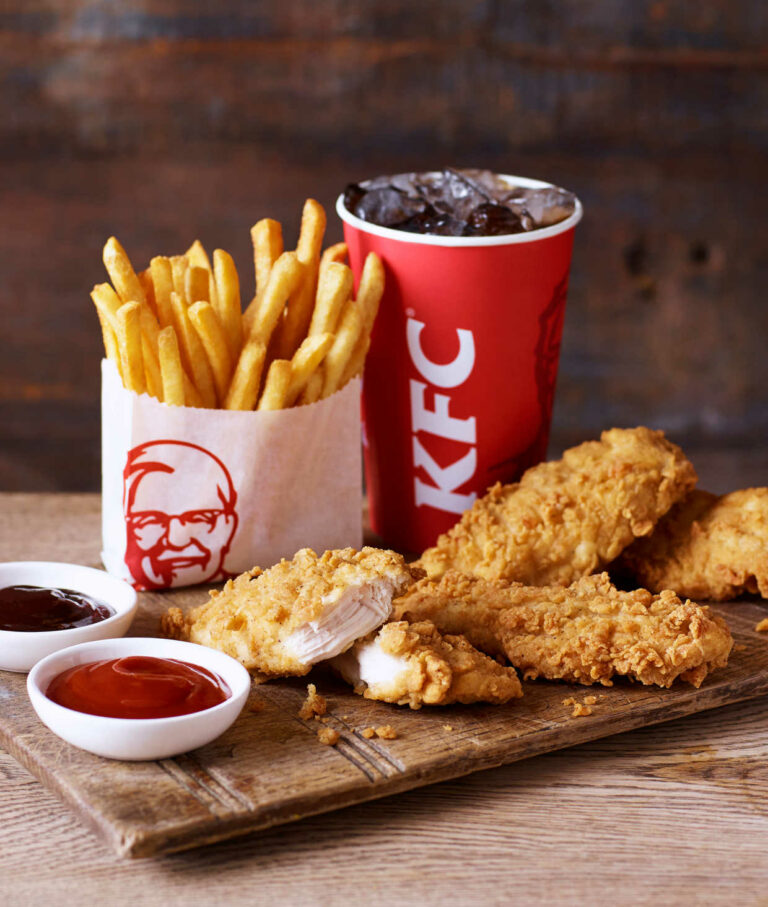KFC is the first fast food chain to sign up to standards that include lower stocking densities and more enrichment. Is this move likely to precipitate a chain reaction?
The words ‘bargain bucket’ haven’t traditionally been associated with higher welfare sourcing. Yet, in July, KFC in the UK and Ireland, Germany, the Netherlands, Belgium and Sweden became the first major fast food chain to sign up to the Better Chicken Commitment, also known as European Chicken Commitment.
The commitment means that by 2026 all the farms that supply KFC’s restaurants in the UK and Ireland, Germany, the Netherlands, Belgium and Sweden will move to slower growing breeds such as Hubbard JA757, 787, 957, or 987, Rambler Ranger, Ranger Classic, and Ranger Gold.
The commitment means a maximum stocking density of 30kg/m2, more natural light and enrichment such as straw bales and the use of controlled atmospheric stunning.
KFC in Europe buys 73 million chickens per year and in the UK is responsible for 4% of all chickens reared for meat.
Last year a petition signed by over half a million people supporting a campaign by the farming welfare charity World Animal Protection was handed in to KFC’s HQ. As with the end of caged eggs in major retailers by 2025, which came about as a result of a petition, the direct action appears to have worked.
As well as signing up to the Better Chicken Commitment KFC will also use third-party auditing to verify its commitments, publicly report on progress every year and provide funding for research into chicken welfare.
Paula MacKenzie, chief executive of KFC UK & Ireland, said: “Our business depends on the health, sustainability and reputation of chicken farming, and our customers care about improving the lives of the chicken we buy.”
The NFU has concerns however that the focus on lower stocking densities ignores the impact of stockmanship. It also ignores the fact slower growing breeds with lower stocking densities have a greater environmental impact than more efficiently produced poultry.
“The NFU has consistently maintained that it is the quality of animal husbandry and stockmanship that are the greatest factors determining animal health and welfare, not farm size or system of production,” said the NFU’s chief poultry advisor Gary Ford.
“We have concerns that the ‘Better Chicken commitment’ does not recognise the advancements that have been made in poultry farming and that it is not reflecting on the latest scientific evidence. For example, poultry meat farms in the UK implement stocking densities that are far lower than the EU requirements, antibiotic use has declined by over 80% in the past six years in the poultry meat sector, and advancements in genetics mean that birds now have the best health they ever have.”
The British Veterinary Poultry Association President Philip Hammond also commented: “The UK has some of the highest welfare standards in the world, producing high quality, safe, affordable products from animals cared for in a sustainable welfare friendly environment. The UK poultry industry is a world leader, optimising welfare, embracing innovation and driving down antimicrobial usage – for which the industry can be proud.”
Despite this, it’s clear farmers will have to follow what its retailer and foodservice customers demand, and it appears momentum is building towards lower densities – even in businesses that originally built their brands on offering value for money.
KFC clearly believes other chains will follow suit. MacKenzie called on other fast food chains to do exactly that, saying it represented around 4% of the UK chicken market. “We’re only a small part of the jigsaw compared to our industry peers collectively,” she said. “To inspire real change and provoke meaningful action, we need the industry to move with us.”
The Chicken Commitment: who has signed up?
- KFC has publicly committed to sourcing chicken to higher welfare standards by signing up to the 2026 Better Chicken Commitment in the UK, Ireland, the Netherlands, Belgium, Sweden and Germany.
- Sodexo has committed to source 100% of their chicken meat from systems compliant with the criteria set out in the European Chicken Commitment, across all of its European operations, by 2026.
- One of the largest global contract caterers, Compass Group, has also signed up.
- Monoprix is the first French retailer to sign up to the European Chicken Commitment, and aims to meet the criteria for its own-label fresh chicken ahead of schedule, by 2024.
- M&S has signed up to the 2026 European Chicken Commitment across 100% of their fresh and ingredient chicken offer.
- Unilever’s commitment covers all its chicken bouillons and soups.
- Elior Group has committed to using only higher welfare chicken globally by 2026.
- By 2026, all Nestlé food products that use chicken as an ingredient in Europe will move to the higher welfare standards as set out in the European Chicken Commitment.
- Danone recently committed to improve broiler welfare across its European supply chain.
- Waitrose has signed up to the 2026 European Chicken Commitment.


